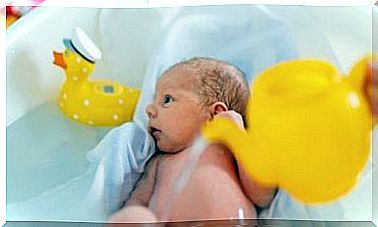When Your Baby Starts To Speak And Only You Can Understand It

The love that mothers (and fathers) have for their baby can show itself in the most amazing ways. The connection between them is so intimate that their own feelings guide them and help them understand their little darling’s babble. As a mother, you are his translator in that strange and fascinating early days when your baby begins to speak.
We are sure that you have experienced the following situation more than once : You are out with friends or family when your baby suddenly starts to chuckle emphatically and make different sounds. Immediately everyone asks you laughingly what your baby would like to say.
Without really knowing how and why, you take on the role of translator. You interpret sounds, gestures, screams and babbling with little effort. Believe it or not, you know exactly what your child is trying to say. You can interpret his gestures and understand his feelings, looks, and intentions.
Together you created your own little universe. You won’t miss anything here. You take the lead by slowly articulating your child’s sounds in full sentences. They shape and create meaningful language that connects your child with the rest of the world.
The whole thing is a wonderful task, which undoubtedly has a strange origin …
Your baby begins to speak thanks to “Mommy’s phrase”

Jenn Berman, a family psychotherapist and an expert on communication and parenting dynamics, recently published an interesting book called “Super Baby” (published by Everest Publishing House). In this book she explains something that is quite unique and amazing: Mothers naturally understand how best to communicate with their babies.
- Experts differentiate between “baby talk” and “mom’s saying”.
- When we talk to a small child who cannot speak yet, we usually do so through a kind of baby language in which we often repeat many syllables several times. Example: Ta-ta, gu-gu, ba-ba, etc.
- Whether or not we believe that this type of communication is silly and childish, it can at least be said that it is not as effective as the language of the parents. After all, they spend so much time with their child that they have instinctively learned how best to communicate with them.
- “Mama’s (or Papa’s) phrase” is characterized by a normal style of speech with a slow pace of speech.
- The parents speak in an exemplary and natural way. They also make sure to use everyday words and stress them in the normal way. So you don’t limit yourself to repeating syllables in your communication.
- They adapt the tone of their voice to the hearing of their baby. In addition, words are pronounced particularly precisely so that the child can learn the different sounds.
Mama understands me: a sensitive connection

There are women who limit themselves to talking about maternal instinct and the hormonal explosion that makes a woman a mother in an almost magical way.
However, an emotional connection is not only created automatically at birth. It actually comes from something that is deeper. It’s something that you don’t even need to be pregnant for.
I understand you because you are part of me
Sometimes one look is enough to know if your child is hungry, scared, or if they have other problems that you want to start resolving without hesitation.
The maternal and paternal instincts arise from the daily contact, the mutual closeness, countless sleepless nights and from the personality, the preferences and the reactions that we see in the child.
All of this shows up sooner or later in the babbling and in the sounds that it makes, for example when it is happy about its favorite toy or when it wants to make something else understandable to you.
Babies communicate not only through mimicking, but also through the emotional interactions you emanate.

Emotional sounds
Every babble, every sob, every emotional expression and also the first utterance of the words “mom” and “dad” comes from a supportive environment.
- The more stimulation and confirmation children receive, the more effective their communication and the more positive their feelings are. However, we shouldn’t worry too much if the child’s language development is slow. Every child needs its time, and every child follows its own rhythm in development.
- In order to constantly convey calm and self-confidence to our children through regular and relaxed communication, love is required above all.
A mother will always understand her little darling, and a father also acts as a translator. In this way, both parents can continuously develop their child’s communication skills.









